Python 내장 함수
- 1. 파이썬 내장 함수 정보기술 시대에 유익한 파이썬 프로그래밍 – 제 6 강 (2) 동양미래대학교 2015.7 최용 <[email protected]>
- 3. Python3 내장 함수 Built-in Functi ons abs() dict() help() min() setattr() all() dir() hex() next() slice() any() divmod() id() object() sorted() ascii() enumerate() input() oct() staticmethod() bin() eval() int() open() str() bool() exec() isinstance() ord() sum() bytearray() filter() issubclass() pow() super() bytes() float() iter() print() tuple() callable() format() len() property() type() chr() frozenset() list() range() vars() classmethod() getattr() locals() repr() zip() compile() globals() map() reversed() __import__() complex() hasattr() max() round() delattr() hash() memoryview() set() https://docs.python.org/3/library/functions.html
- 4. abs() >>> abs(-3) 3 >>> abs(-3.0) 3.0 >>> z = complex(1, 2) >>> abs(z) 2.23606797749979
- 5. all() >>> all([True, True, True]) True >>> all([True, False, True]) False
- 6. any() >>> any([True, False, True]) True >>> any((False, False, False)) False
- 7. ascii() >>> ascii('''Airbed ... Breakfast''') "'AirbednBreakfast'" >>> ascii('김치') "'uae40uce58'"
- 8. bin() >>> bin(1) '0b1' >>> bin(2) '0b10' >>> bin(3) '0b11' >>> bin(4) '0b100'
- 9. bool() >>> bool(True) True >>> bool(2 < 3) True >>> bool(1) True >>> bool(3 % 2) True >>> bool(not None) True >>> bool(False) False >>> bool(2 > 3) False >>> bool(0) False >>> bool(4 % 2) False >>> bool(None) False >>> bool() False
- 10. bytearray() >>> data = bytearray(b'Monty Python') >>> data[5] = 33 # mutable >>> data bytearray(b'Monty!Python') http://python3porting.com/problems.html#manipulating-binary-data http://dabeaz.blogspot.kr/2010/01/few-useful-bytearray-tricks.html
- 11. bytes() >>> b'Python' b'Python' >>> type(b'Python') <class 'bytes'> >>> b'파이썬' File "<stdin>", line 1 SyntaxError: bytes can only contain ASCII literal characters. >>> bytes('Python', 'utf-8') b'Python' >>> bytes('파이썬', 'utf-8') b'xedx8cx8cxecx9dxb4xecx8dxac'
- 12. callable() >>> def sum(x, y): ... return x + y ... >>> callable(sum) True >>> x = 10 >>> callable(x) False >>> class MyClass: ... pass ... >>> callable(MyClass) True >>> obj = MyClass() >>> callable(obj) False http://joequery.me/code/python-builtin-functions/#callable
- 13. chr() >>> chr(65) 'A' >>> chr(97) 'a' >>> chr(49) '1'
- 14. classmethod() >>> class Pizza: ... radius = 42 ... @classmethod ... def get_radius(cls): ... return cls.radius ... >>> Pizza.get_radius() 42 https://julien.danjou.info/blog/2013/guide-python-static-class-abstract-methods
- 15. compile() >>> codeobj = compile('x = 2nprint("X is " + str(x))', # source ... 'fakemodule', # file name ... 'exec') # mode >>> exec(codeobj) X is 2 http://stackoverflow.com/questions/22443939/python-built-in-function-compile-what-is-it-used-for
- 16. complex() >>> x = complex("4+2j") >>> x (4+2j) >>> y = complex("4-5j") >>> y (4-5j) >>> x+y (8-3j) >>> x*y (26-12j) >>> complex("4") (4+0j) http://joequery.me/code/python-builtin-functions/#complex
- 17. delattr() >>> class Employee: ... def __init__(self, name, salary): ... self.name = name ... self.salary = salary ... >>> j = Employee("John", "2000$") >>> j.salary '2000$' >>> delattr(j, "salary") >>> hasattr(j, "salary") False
- 18. dict() >>> dict() {} >>> dict( [[1, 'a'], [2, 'b'], [3, 'c']] ) {1: 'a', 2: 'b', 3: 'c'} >>> dict( ((1, 'a'), (2, 'b'), (3, 'c')) ) {1: 'a', 2: 'b', 3: 'c'}
- 19. dir() >>> class Shape: ... def __dir__(self): ... return ['area', 'perimeter', 'location'] ... >>> s = Shape() >>> dir(s) ['area', 'location', 'perimeter'] >>> import struct >>> dir(struct) ['Struct', '__all__', '__builtins__', '__cached__', '__doc__', '__file__', '__loader__', '__name__', '__pack age__', '__spec__', '_clearcache', 'calcsize', 'error', 'iter_unpack', 'pack', 'pack_into', 'unpack', 'unpack_ from']
- 20. divmod() >>> divmod(7, 3) (2, 1) >>> divmod(8.4, 4.2) (2.0, 0.0) >>> divmod(8.5, 4.2) (2.0, 0.09999999999999964)
- 21. enumerate() >>> seasons = ['Spring', 'Summer', 'Fall', 'Winter'] >>> list(enumerate(seasons)) [(0, 'Spring'), (1, 'Summer'), (2, 'Fall'), (3, 'Winter')] >>> list(enumerate(seasons, start=1)) [(1, 'Spring'), (2, 'Summer'), (3, 'Fall'), (4, 'Winter')]
- 22. eval() >>> x = 1 >>> eval('x + 1') 2 >>> y = eval('x + 2') >>> y 3 >>> a = 10 >>> b = 5 >>> D = {'a': 2, 'b': 3} >>> eval('a + b') 15 >>> eval('a + b', D) 5
- 23. exec() >>> a = 3 >>> exec('b = 2') # eval()과 달리, 값을 리턴하지 않음 >>> exec('c = a + b') >>> c 5
- 24. filter() >>> N = range(1, 11) >>> Even = list() >>> for n in N: ... if n % 2 == 0: ... Even.append(n) ... >>> Even [2, 4, 6, 8, 10] >>> Odd = list(filter(lambda x: x % 2, N)) >>> Odd [1, 3, 5, 7, 9]
- 25. float() >>> float(1) 1.0 >>> float(1.234) 1.234 >>> float('+1.23') 1.23 >>> float(' -12345n') -12345.0 >>> float('1e-003') 0.001 >>> float('+1E6') 1000000.0 >>> float('-Infinity') -inf
- 26. format() >>> L = [['a', 123], ['by', 45.6], ['cow', 7.89]] >>> for s, n in L: ... print(s, n) ... a 123 by 45.6 cow 7.89 >>> for s, n in L: ... print(format(s, '^10') + '|' + format(n, '<.2f')) ... a |123.00 by |45.60 cow |7.89 http://joequery.me/code/python-builtin-functions/#format
- 27. frozenset() set • mutable • add() • remove() frozenset • immutable: 생성된 이후에는 내용을 변경할 수 없음
- 28. getattr() >>> class MyClass: ... x = 0 ... y = 1 ... >>> myobj = MyClass() >>> getattr(myobj, 'x') 0
- 29. globals() >>> globals() {'__name__': '__main__', '__builtins__': <module 'builtins' (built-in)>, '__loader__': <class '_frozen_ importlib.BuiltinImporter'>, '__spec__': None, '__ doc__': None, '__package__': None} >>> balance = 200 >>> cost = 50 >>> globals() {'__name__': '__main__', '__builtins__': <module 'builtins' (built-in)>, 'balance': 200, '__loader__': < class '_frozen_importlib.BuiltinImporter'>, '__spe c__': None, '__doc__': None, '__package__': Non e, 'cost': 50} >>> eval('balance - cost') 150 >>> mylocals = {'cost': 75} >>> eval('balance - cost', mylocals) Traceback (most recent call last): File "<stdin>", line 1, in <module> File "<string>", line 1, in <module> NameError: name 'balance' is not defined >>> eval('balance - cost', globals(), mylocals) 125 http://joequery.me/code/python-builtin-functions/#eval
- 30. hasattr() >>> class MyClass: ... x = 0 ... y = 1 ... >>> myobj = MyClass() >>> hasattr(myobj, 'y') True >>> hasattr(myobj, 'z') False
- 31. hash() >>> hash('One little, two little, three little indians') -7814896826006998464 >>> hash('indian') -8497506485016990678 >>> hash('boy') 2674027540618413217 >>> hash('One little, two little, three little indians') -7814896826006998464 >>> hash('indian') -8497506485016990678 http://stackoverflow.com/questions/7646520/is-this-an-appropriate-use-of-pythons-built-in-hash-function http://www.pythoncentral.io/hashing-strings-with-python/
- 32. help() >>> help(eval) Help on built-in function eval in module builtins: eval(...) eval(source[, globals[, locals]]) -> value Evaluate the source in the context of globals and locals. The source may be a string representing a Python expression or a code object as returned by compile(). The globals must be a dictionary and locals can be any mapping, defaulting to the current globals and locals. If only globals is given, locals defaults to it.
- 33. hex() >>> for n in range(20): ... print(hex(n)) ... 0x0 0x1 0x2 0x3 0x4 0x5 0x6 0x7 0x8 0x9 0xa 0xb 0xc 0xd 0xe 0xf 0x10 0x11 0x12 0x13
- 34. id() >>> a = 1 >>> b = 2 >>> L = [a, b] >>> M = L >>> id(L[0]) 4297370688 >>> id(M[0]) 4297370688
- 35. input() >>> s = input('Type any string: ') Type any string: Python >>> print(s) Python
- 36. int() >>> n = int(input('Type any number: ')) Type any number: 3 >>> print(n * n) 9
- 37. isinstance() >>> class Human: ... pass ... >>> me = Human() >>> isinstance(me, Human) True >>> class Robot: ... pass ... >>> you = Robot() >>> isinstance(you, Human) False >>> class Vehicle: ... pass ... >>> class Car(Vehicle): ... pass ... >>> mycar = Car() >>> isinstance(mycar, Car) True >>> isinstance(mycar, Vehicle) True
- 38. issubclass() >>> class Vehicle: ... pass ... >>> class Car(Vehicle): ... pass ... >>> issubclass(Car, Vehicle) True
- 39. iter() >>> my_list = [5, 1, 6, 3] >>> my_iter = iter(my_list) >>> next(my_iter) 5 >>> next(my_iter) 1 >>> next(my_iter) 6 >>> next(my_iter) 3
- 40. len() >>> len('Python') 6 >>> len('파이썬') 3 >>> len([2, 3, 6, 4, 5, 20]) 6
- 41. list() >>> list([1, 2, 3]) [1, 2, 3] >>> list((1, 2, 3)) [1, 2, 3] >>> list('XYZxyz') ['X', 'Y', 'Z', 'x', 'y', 'z']
- 42. locals() >>> def foo(arg): # 함수 foo는 로컬 네임스페이스에 두 개의 변수 arg와 x를 가짐 ... x = 1 ... print(locals()) ... >>> foo(7) # locals는 이름/값 사전을 리턴 {'x': 1, 'arg': 7} >>> foo('bar') {'x': 1, 'arg': 'bar'} http://www.diveintopython.net/html_processing/locals_and_globals.html
- 43. map() for … in … >>> M = list() >>> for x in range(1, 6): ... M.append(x % 2) ... >>> M [1, 0, 1, 0, 1] map() >>> map(lambda x: x % 2, range(1, 6)) <map object at 0x101a67d30> >>> list(_) [1, 0, 1, 0, 1]
- 44. max() >>> max(1234, 234, 34, 4) 1234 >>> max([3, 9, 27]) 27 >>> max('return') 'u'
- 45. memoryview() >>> ba = bytearray(b'abcdefgh') >>> mv = memoryview(ba) >>> mv[4:6] <memory at 0x0000000002BB7CC8> >>> mv[4:6].tobytes() b'ef' >>> mv[4:6] = b'ZA' >>> ba bytearray(b'abcdZAgh') http://eli.thegreenplace.net/2011/11/28/less-copies-in-python-with-the-buffer-protocol-and-memoryviews
- 46. min() >>> min(1234, 234, 34, 4) 4 >>> min('invest') 'e'
- 47. next() >>> my_list = [5, 1, 6, 3] >>> my_iter = iter(my_list) >>> next(my_iter) 5 >>> next(my_iter) 1 >>> next(my_iter) 6 >>> next(my_iter) 3
- 48. object() >>> obj = object() >>> type(obj) <class 'object'>
- 49. oct() >>> for n in range(1, 21): ... print(str(n) + ': ' + oc t(n)) ... 1: 0o1 2: 0o2 3: 0o3 4: 0o4 5: 0o5 6: 0o6 7: 0o7 8: 0o10 9: 0o11 10: 0o12 11: 0o13 12: 0o14 13: 0o15 14: 0o16 15: 0o17 16: 0o20 17: 0o21 18: 0o22 19: 0o23 20: 0o24
- 50. open() >>> with open("test.txt", "wt") as out_file: ... out_file.write("This Text is going to out filenLook at it and see!") ... 50 >>> with open("test.txt", "rt") as in_file: ... text = in_file.read() ... >>> print(text) This Text is going to out file Look at it and see! https://en.wikibooks.org/wiki/Non-Programmer%27s_Tutorial_for_Python_3/File_IO
- 51. ord() >>> ord('A') 65 >>> ord('a') 97 >>> ord('1') 49
- 53. print() >>> print('Python 3.4') Python 3.4 >>> print('Python', '3.4') Python 3.4 >>> print('Python', '3.4', sep=' ') Python 3.4 >>> print('Python', '3.4', sep=' _') Python_3.4 >>> for x in range(3): ... print(x, end='n') ... 0 1 2 >>> for x in range(3): ... print(x, end='t') ... 0 1 2 >>>
- 54. property() class C: def __init__(self): self._x = None @property def x(self): """I'm the 'x' property.""" return self._x @x.setter def x(self, value): self._x = value @x.deleter def x(self): del self._x >>> c = C() >>> c.x = 10 >>> print(c.x) 10 >>> del c.x >>> help(C) Help on class C in module __main__: class C(builtins.object) | Methods defined here: | | __init__(self) | | ----------------------------------------------------------- ----------- | Data descriptors defined here: | | __dict__ | dictionary for instance variables (if defined) | | __weakref__ | list of weak references to the object (if defined) | | x | I'm the 'x' property.
- 55. range() >>> range(10) range(0, 10) >>> list(range(5)) [0, 1, 2, 3, 4] >>> tuple(range(5)) (0, 1, 2, 3, 4) >>> for x in range(0, 10, 2): ... print(x) ... 0 2 4 6 8 >>> for y in range(10, 0, -1): ... print(y) ... 10 9 8 7 6 5 4 3 2 1
- 56. repr() >>> repr('''Airbed ... Breakfast''') "'AirbednBreakfast'" >>> repr('김치') "'김치'"
- 57. reversed() >>> reversed([0, 1, 2, 3, 4]) <list_reverseiterator object at 0x101a67c50> >>> list(reversed([0, 1, 2, 3, 4])) [4, 3, 2, 1, 0]
- 58. round() >>> round(3.1415) 3 >>> round(3.1415, 2) 3.14
- 59. set() >>> A = set([n for n in range(2, 31, 2)]) >>> 4 in A True >>> len(A) 15 >>> A.add(32) >>> A {32, 2, 4, 6, 8, 10, 12, 14, 16, 18, 20, 22, 24, 26, 28, 30} >>> {4, 8, 12}.issubset(A) True >>> {4, 8, 12} < A True >>> B = set([n for n in range(3, 31, 3)]) >>> C = A.intersection(B) >>> C {24, 18, 12, 6, 30} >>> A.issuperset(C) True >>> sorted(C) [6, 12, 18, 24, 30] >>> D = A.union(B) >>> D {2, 3, 4, 6, 8, 9, 10, 12, 14, 15, 16, 18, 20, 21, 22, 24, 26, 27, 28, 30}
- 60. setattr() >>> class Employee: ... def __init__(self, name, salary): ... self.name = name ... self.salary = salary ... >>> j = Employee("John", "2000$") >>> j.salary '2000$' >>> setattr(j, "salary", "3000$") >>> j.salary '3000$' >>> setattr(j, "gender", "male") >>> j.gender 'male'
- 61. slice() >>> L = [0, 1, 2, 3, 4, 5, 6, 7, 8, 9] >>> L[2:7] [2, 3, 4, 5, 6] >>> L[2:7:2] [2, 4, 6] >>> s = slice(2, 7) >>> L[s] [2, 3, 4, 5, 6] >>> s = slice(2, 7, 2) >>> L[s] [2, 4, 6]
- 62. sorted() >>> sorted([2, 3, 6, 4, 5, 20]) [2, 3, 4, 5, 6, 20]
- 63. staticmethod() >>> class Util: ... @staticmethod ... def add(a, b): ... return a + b ... >>> Util.add(2, 3) 5 http://pyengine.blogspot.kr/2011/08/staticmethod-vs-classmethod.html
- 64. str() >>> str(1) '1' >>> str('a') 'a' >>> str([1, 'a']) "[1, 'a']" >>> str(None) 'None'
- 65. sum() >>> sum([3, 9, 27]) 39
- 66. super() class LoggingDict(dict): def __setitem__(self, key, value): logging.info('Settingto %r' % (key, value)) super().__setitem__(key, value) https://rhettinger.wordpress.com/2011/05/26/super-considered-super/
- 67. tuple() >>> tuple([1, 2, 3]) (1, 2, 3) >>> tuple((1, 2, 3)) (1, 2, 3) >>> tuple('XYZxyz') ('X', 'Y', 'Z', 'x', 'y', 'z')
- 68. type() >>> type(2) <class 'int'> >>> type('boy') <class 'str'> >>> type([2, 'boy']) <class 'list'> >>> type(None) <class 'NoneType'> >>> import calendar >>> type(calendar) <class 'module'> >>> class MyClass: ... pass ... >>> mc = MyClass() >>> type(mc) <class '__main__.MyClass'>
- 69. vars() >>> class Employee: ... def __init__(self, name, salary): ... self.name = name ... self._salary = salary ... ... >>> j = Employee("John", "2000$") >>> vars(j) {'name': 'John', '_salary': '2000$'}
- 70. zip() >>> x = [1, 2, 3] >>> y = [4, 5, 6] >>> zipped = zip(x, y) >>> list(zipped) [(1, 4), (2, 5), (3, 6)] >>> list(zipped) []
- 71. __import__() >>> from math import pi >>> pi 3.141592653589793 >>> _temp = __import__('math', globals(), locals(), ['pi'], 0) >>> pi = _temp.pi >>> pi 3.141592653589793
Editor's Notes
- #30: Return the dictionary containing the current scope's global variables.
- #31: hasattr(...) hasattr(object, name) -> bool Return whether the object has an attribute with the given name. (This is done by calling getattr(object, name) and catching AttributeError.)
- #32: hash(...) hash(object) -> integer Return a hash value for the object. Two objects with the same value have the same hash value. The reverse is not necessarily true, but likely.
- #35: id(...) id(object) -> integer Return the identity of an object. This is guaranteed to be unique among simultaneously existing objects. (Hint: it's the object's memory address.)
- #43: locals(...) locals() -> dictionary Update and return a dictionary containing the current scope's local variables.
- #46: class memoryview(object) | memoryview(object) | | Create a new memoryview object which references the given object.
- #72: Note This is an advanced function that is not needed in everyday Python programming, unlike importlib.import_module().





![all()
>>> all([True, True, True])
True
>>> all([True, False, True])
False](https://image.slidesharecdn.com/python06-2-150721235407-lva1-app6892/85/Python-5-320.jpg)
![any()
>>> any([True, False, True])
True
>>> any((False, False, False))
False](https://image.slidesharecdn.com/python06-2-150721235407-lva1-app6892/85/Python-6-320.jpg)



![bytearray()
>>> data = bytearray(b'Monty Python')
>>> data[5] = 33 # mutable
>>> data
bytearray(b'Monty!Python')
http://python3porting.com/problems.html#manipulating-binary-data
http://dabeaz.blogspot.kr/2010/01/few-useful-bytearray-tricks.html](https://image.slidesharecdn.com/python06-2-150721235407-lva1-app6892/85/Python-10-320.jpg)







![dict()
>>> dict()
{}
>>> dict( [[1, 'a'], [2, 'b'], [3, 'c']] )
{1: 'a', 2: 'b', 3: 'c'}
>>> dict( ((1, 'a'), (2, 'b'), (3, 'c')) )
{1: 'a', 2: 'b', 3: 'c'}](https://image.slidesharecdn.com/python06-2-150721235407-lva1-app6892/85/Python-18-320.jpg)
![dir()
>>> class Shape:
... def __dir__(self):
... return ['area', 'perimeter', 'location']
...
>>> s = Shape()
>>> dir(s)
['area', 'location', 'perimeter']
>>> import struct
>>> dir(struct)
['Struct', '__all__', '__builtins__', '__cached__', '__doc__', '__file__', '__loader__', '__name__', '__pack
age__', '__spec__', '_clearcache', 'calcsize', 'error', 'iter_unpack', 'pack', 'pack_into', 'unpack', 'unpack_
from']](https://image.slidesharecdn.com/python06-2-150721235407-lva1-app6892/85/Python-19-320.jpg)

![enumerate()
>>> seasons = ['Spring', 'Summer', 'Fall', 'Winter']
>>> list(enumerate(seasons))
[(0, 'Spring'), (1, 'Summer'), (2, 'Fall'), (3, 'Winter')]
>>> list(enumerate(seasons, start=1))
[(1, 'Spring'), (2, 'Summer'), (3, 'Fall'), (4, 'Winter')]](https://image.slidesharecdn.com/python06-2-150721235407-lva1-app6892/85/Python-21-320.jpg)


![filter()
>>> N = range(1, 11)
>>> Even = list()
>>> for n in N:
... if n % 2 == 0:
... Even.append(n)
...
>>> Even
[2, 4, 6, 8, 10]
>>> Odd = list(filter(lambda x: x % 2, N))
>>> Odd
[1, 3, 5, 7, 9]](https://image.slidesharecdn.com/python06-2-150721235407-lva1-app6892/85/Python-24-320.jpg)
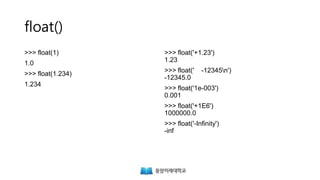
![format()
>>> L = [['a', 123], ['by', 45.6], ['cow', 7.89]]
>>> for s, n in L:
... print(s, n)
...
a 123
by 45.6
cow 7.89
>>> for s, n in L:
... print(format(s, '^10') + '|' + format(n, '<.2f'))
...
a |123.00
by |45.60
cow |7.89 http://joequery.me/code/python-builtin-functions/#format](https://image.slidesharecdn.com/python06-2-150721235407-lva1-app6892/85/Python-26-320.jpg)




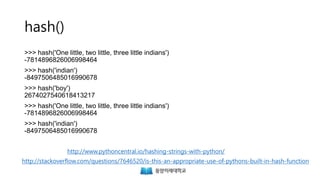
![help()
>>> help(eval)
Help on built-in function eval in module builtins:
eval(...)
eval(source[, globals[, locals]]) -> value
Evaluate the source in the context of globals and locals.
The source may be a string representing a Python expression
or a code object as returned by compile().
The globals must be a dictionary and locals can be any mapping,
defaulting to the current globals and locals.
If only globals is given, locals defaults to it.](https://image.slidesharecdn.com/python06-2-150721235407-lva1-app6892/85/Python-32-320.jpg)
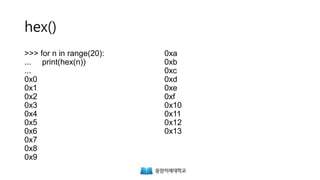
![id()
>>> a = 1
>>> b = 2
>>> L = [a, b]
>>> M = L
>>> id(L[0])
4297370688
>>> id(M[0])
4297370688](https://image.slidesharecdn.com/python06-2-150721235407-lva1-app6892/85/Python-34-320.jpg)


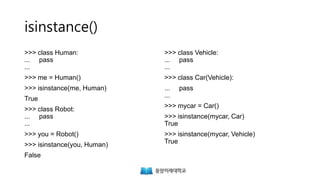

![iter()
>>> my_list = [5, 1, 6, 3]
>>> my_iter = iter(my_list)
>>> next(my_iter)
5
>>> next(my_iter)
1
>>> next(my_iter)
6
>>> next(my_iter)
3](https://image.slidesharecdn.com/python06-2-150721235407-lva1-app6892/85/Python-39-320.jpg)
![len()
>>> len('Python')
6
>>> len('파이썬')
3
>>> len([2, 3, 6, 4, 5, 20])
6](https://image.slidesharecdn.com/python06-2-150721235407-lva1-app6892/85/Python-40-320.jpg)
![list()
>>> list([1, 2, 3])
[1, 2, 3]
>>> list((1, 2, 3))
[1, 2, 3]
>>> list('XYZxyz')
['X', 'Y', 'Z', 'x', 'y', 'z']](https://image.slidesharecdn.com/python06-2-150721235407-lva1-app6892/85/Python-41-320.jpg)

![map()
for … in …
>>> M = list()
>>> for x in range(1, 6):
... M.append(x % 2)
...
>>> M
[1, 0, 1, 0, 1]
map()
>>> map(lambda x: x % 2, range(1, 6))
<map object at 0x101a67d30>
>>> list(_)
[1, 0, 1, 0, 1]](https://image.slidesharecdn.com/python06-2-150721235407-lva1-app6892/85/Python-43-320.jpg)
![max()
>>> max(1234, 234, 34, 4)
1234
>>> max([3, 9, 27])
27
>>> max('return')
'u'](https://image.slidesharecdn.com/python06-2-150721235407-lva1-app6892/85/Python-44-320.jpg)
![memoryview()
>>> ba = bytearray(b'abcdefgh')
>>> mv = memoryview(ba)
>>> mv[4:6]
<memory at 0x0000000002BB7CC8>
>>> mv[4:6].tobytes()
b'ef'
>>> mv[4:6] = b'ZA'
>>> ba
bytearray(b'abcdZAgh')
http://eli.thegreenplace.net/2011/11/28/less-copies-in-python-with-the-buffer-protocol-and-memoryviews](https://image.slidesharecdn.com/python06-2-150721235407-lva1-app6892/85/Python-45-320.jpg)
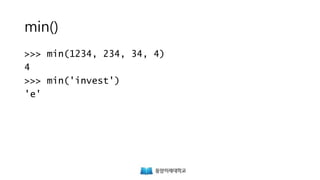
![next()
>>> my_list = [5, 1, 6, 3]
>>> my_iter = iter(my_list)
>>> next(my_iter)
5
>>> next(my_iter)
1
>>> next(my_iter)
6
>>> next(my_iter)
3](https://image.slidesharecdn.com/python06-2-150721235407-lva1-app6892/85/Python-47-320.jpg)






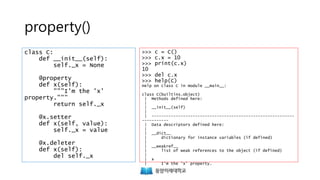
![range()
>>> range(10)
range(0, 10)
>>> list(range(5))
[0, 1, 2, 3, 4]
>>> tuple(range(5))
(0, 1, 2, 3, 4)
>>> for x in range(0, 10, 2):
... print(x)
...
0
2
4
6
8
>>> for y in range(10, 0, -1):
... print(y)
...
10
9
8
7
6
5
4
3
2
1](https://image.slidesharecdn.com/python06-2-150721235407-lva1-app6892/85/Python-55-320.jpg)

![reversed()
>>> reversed([0, 1, 2, 3, 4])
<list_reverseiterator object at 0x101a67c50>
>>> list(reversed([0, 1, 2, 3, 4]))
[4, 3, 2, 1, 0]](https://image.slidesharecdn.com/python06-2-150721235407-lva1-app6892/85/Python-57-320.jpg)

![set()
>>> A = set([n for n in range(2, 31, 2)])
>>> 4 in A
True
>>> len(A)
15
>>> A.add(32)
>>> A
{32, 2, 4, 6, 8, 10, 12, 14, 16, 18, 20, 22, 24, 26,
28, 30}
>>> {4, 8, 12}.issubset(A)
True
>>> {4, 8, 12} < A
True
>>> B = set([n for n in range(3, 31,
3)])
>>> C = A.intersection(B)
>>> C
{24, 18, 12, 6, 30}
>>> A.issuperset(C)
True
>>> sorted(C)
[6, 12, 18, 24, 30]
>>> D = A.union(B)
>>> D
{2, 3, 4, 6, 8, 9, 10, 12, 14, 15,
16, 18, 20, 21, 22, 24, 26, 27, 28,
30}](https://image.slidesharecdn.com/python06-2-150721235407-lva1-app6892/85/Python-59-320.jpg)

![slice()
>>> L = [0, 1, 2, 3, 4, 5, 6, 7,
8, 9]
>>> L[2:7]
[2, 3, 4, 5, 6]
>>> L[2:7:2]
[2, 4, 6]
>>> s = slice(2, 7)
>>> L[s]
[2, 3, 4, 5, 6]
>>> s = slice(2, 7, 2)
>>> L[s]
[2, 4, 6]](https://image.slidesharecdn.com/python06-2-150721235407-lva1-app6892/85/Python-61-320.jpg)
![sorted()
>>> sorted([2, 3, 6, 4, 5, 20])
[2, 3, 4, 5, 6, 20]](https://image.slidesharecdn.com/python06-2-150721235407-lva1-app6892/85/Python-62-320.jpg)

![str()
>>> str(1)
'1'
>>> str('a')
'a'
>>> str([1, 'a'])
"[1, 'a']"
>>> str(None)
'None'](https://image.slidesharecdn.com/python06-2-150721235407-lva1-app6892/85/Python-64-320.jpg)
![sum()
>>> sum([3, 9, 27])
39](https://image.slidesharecdn.com/python06-2-150721235407-lva1-app6892/85/Python-65-320.jpg)

![tuple()
>>> tuple([1, 2, 3])
(1, 2, 3)
>>> tuple((1, 2, 3))
(1, 2, 3)
>>> tuple('XYZxyz')
('X', 'Y', 'Z', 'x', 'y', 'z')](https://image.slidesharecdn.com/python06-2-150721235407-lva1-app6892/85/Python-67-320.jpg)
![type()
>>> type(2)
<class 'int'>
>>> type('boy')
<class 'str'>
>>> type([2, 'boy'])
<class 'list'>
>>> type(None)
<class 'NoneType'>
>>> import calendar
>>> type(calendar)
<class 'module'>
>>> class MyClass:
... pass
...
>>> mc = MyClass()
>>> type(mc)
<class '__main__.MyClass'>](https://image.slidesharecdn.com/python06-2-150721235407-lva1-app6892/85/Python-68-320.jpg)

![zip()
>>> x = [1, 2, 3]
>>> y = [4, 5, 6]
>>> zipped = zip(x, y)
>>> list(zipped)
[(1, 4), (2, 5), (3, 6)]
>>> list(zipped)
[]](https://image.slidesharecdn.com/python06-2-150721235407-lva1-app6892/85/Python-70-320.jpg)
![__import__()
>>> from math import pi
>>> pi
3.141592653589793
>>> _temp = __import__('math', globals(), locals(), ['pi'], 0)
>>> pi = _temp.pi
>>> pi
3.141592653589793](https://image.slidesharecdn.com/python06-2-150721235407-lva1-app6892/85/Python-71-320.jpg)